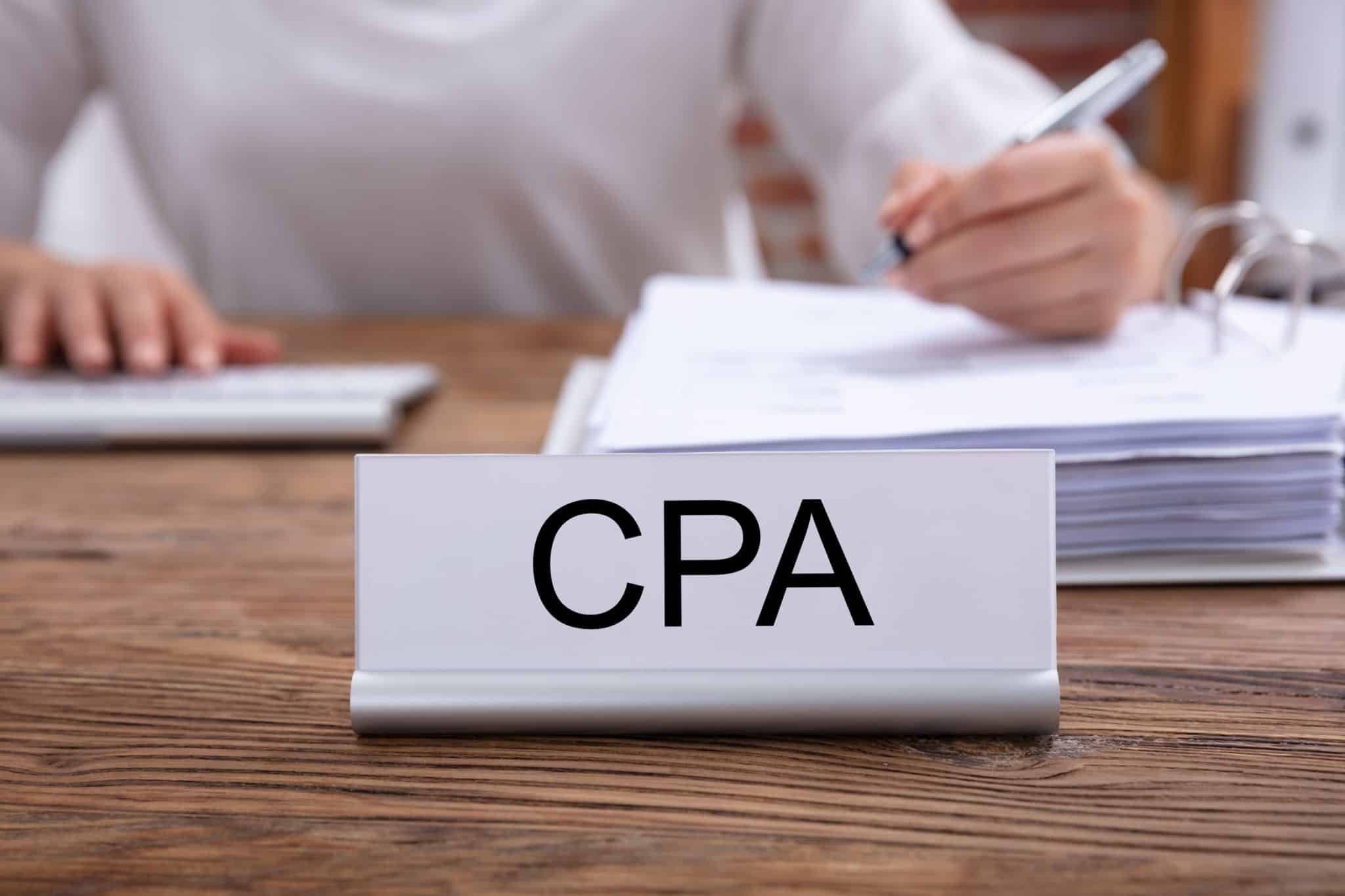Do you have what it takes to become a Certified Public Accountant (CPA)? It may seem daunting, but it can be easy with the right information and guidance!
In this article, we will outline the five steps that you can take to become a CPA. We will also provide some helpful resources along the way. Let’s get started!
So, How Do You Become a CPA?
Becoming a CPA is no small feat. It requires commitment, dedication, and a comprehensive understanding of accounting principles, taxation laws, and ethical standards for the public practice of accounting.
Here are five steps to follow to become a CPA:
- Get an Undergrad Degree
- Pass the CPA Exam
- Get Your License
- Maintain Your Licence
- Get a Masters’s Degree (Optional)
Step 1: Get an Undergrad Degree
Becoming a CPA starts with obtaining an undergraduate degree in accounting or business-related fields such as finance or economics.
In most cases, a bachelor’s degree in accounting should include the following courses:
- Financial Reporting
- Business Law & Ethics
- Federal Tax Procedures
- Auditing Theory & Practices
- Cost Analysis & Control Procedures
- Financial Data Analysis & Interpretation
To be eligible for the CPA examination, an individual needs to possess a college degree from an accredited university or college with at least 150 semester hours, including a bachelor’s degree with 30 semester hours in accounting topics such as financial reporting, auditing, taxation, cost, and managerial accounting.

Additionally, individuals may need additional professional ethics coursework or financial literacy courses to meet state board requirements. CPAs who’ve already obtained a license in another state may be exempt from certain requirements depending on their experience.
Step 2: Pass the CPA Exam
To become certified, an individual must meet specific educational requirements and pass a rigorous exam. Depending on the state, these requirements may vary slightly but generally consist of completing a certain amount of college-level accounting coursework and passing the Uniform CPA Examination.
Once all educational criteria are satisfied, individuals can apply to sit for the Uniform CPA Examination administered by The American Institute of CPAs (AICPA).
This exam is divided into four sections:
- Regulation (REG)
- Auditing & Attestation (AUD)
- Financial Accounting & Reporting (FAR)
- Business Environment & Concepts (BEC)
Each part is composed of multiple-choice questions along with task-based simulations that require examinees to apply the knowledge they have learned to answer the questions correctly.
After successfully passing all four parts of the examination within 18 months and fulfilling any other applicable requirements, like one year of supervised work experience under a qualified CPA practitioner or two years of public accounting experience, individuals will be able to apply for licensure through their particular State Board and become licensed CPAs.
Step 3: Get Your License
After completing educational requirements and passing the exam, candidates must meet any additional licensing criteria imposed on them by their respective state boards of accountancy to become officially certified CPAs.
These requirements may vary from state to state. Still, they will often include professional references from licensed CPAs or other professionals, as well as being fingerprinted to verify identity before being granted permission to practice as a CPA.
Once officially licensed, they can begin working in various capacities within public practice or industry, such as providing financial advice or preparing tax returns for businesses and individuals.
Step 4: Maintain Your Licence
Maintaining your CPA license is an important part of the job and requires a commitment to professional excellence. Continuing Professional Education (CPE) requires all CPAs to retain their license and remain up to date on the latest accounting laws and regulations.
CPE credits are earned through courses, seminars, or other training activities that stay current with changes in the industry. The number of hours required depends on individual state requirements, but most states require at least 20 hours of education yearly. Additionally, each CPA must adhere to their respective state’s code of professional conduct.
This code broadly outlines the ethical responsibilities of all CPAs:
- Avoiding conflicts of interest
- Maintaining confidentiality with client information
- Providing unbiased and accurate services and reports
- Divulging any potential issues or discrepancies found working for clients
- Adhering to standards when performing audits or other attestation services
It is essential for CPAs working in public practice to understand these rules to minimize any potential liability risks associated with their professional engagements.
Furthermore, many states have additional requirements, such as passing an ethics exam before license renewal or participating in peer review. This helps ensure quality control over professional services provided by CPAs practicing in their area.
However, failing to comply with continuing education requirements or ethical guidelines can lead to suspension or revocation of one’s CPA license, among other disciplinary actions taken by a state board of accountancy.
That is why CPAs must keep up-to-date with all licensure maintenance requirements and accounting trends associated with their profession so as not only to ensure compliance but also to uphold the highest level of integrity throughout their practice history.
Step 5: Get a Masters’s Degree (Optional)
For some CPAs, getting a master’s degree is an important part of achieving success in their field. A master’s in accounting or finance helps individuals gain a deeper understanding of the industry, which can help them become more successful CPAs. In addition, many states and jurisdictions require CPAs to have a master’s degree before being licensed.
Once applicants have completed their bachelor’s degree, they can look into programs that provide the necessary training and education to become certified public accountants.
These programs typically include classes such as:
- Taxation Law
- Cost Management
- Auditing Principles
- Financial Statement Analysis

In addition to classroom instruction, many graduate-level accounting programs provide internships or hands-on experiences with accounting firms and other organizations.
Experiential learning opportunities like this are beneficial because they allow students to get real-world experience that will be invaluable when it’s time for them to sit for the CPA exam. Moreover, such experiences often give future CPAs an edge when seeking employment after graduation.
What Are the CPA Education Requirements?
Individual states set the CPA education requirements, so the details vary from place to place. Generally speaking, becoming a CPA requires a bachelor’s degree in accounting from a qualified college or university and passing the Uniform CPA Examination.
To stay current with changes in the accounting field, CPAs must fulfill certain continuing professional education (CPE) requirements on an ongoing basis. The specifics vary from state to state but typically involve taking courses or attending seminars intended to keep professionals up-to-date on changes in relevant regulations and industry best practices.
Some states also require CPAs to fulfill ethical responsibilities above-and-beyond those generally required for other professions. For example, some jurisdictions demand more stringent confidentiality rules for CPAs who work with sensitive financial data.
Additionally, several states require a periodic reexamination of CPAs, ensuring that practitioners remain competent in their field.
What Are the CPA Certifications & Licenses?
The Certified Public Accountant (CPA) certifications and licenses are a recognized symbol of proficiency in finance, accounting, tax, and auditing. The most common certification for CPAs is the Certified Public Accountant license.
However, for those interested in specializing in certain fields of accounting or enhancing their professional credentials, there are numerous other certifications available for CPAs who have completed the necessary qualifications.
These include the following but are not limited to:
- Enrolled Agent (EA)
- Certified Internal Auditor (CIA)
- Certified Fraud Examiner (CFE)
- Chartered Financial Analyst (CFA)
- Personal Financial Specialist (PFS)
- Certified Management Accountant (CMA)
- Chartered Global Management Accountant (CGMA)
Depending upon the specific job requirements and your desired field of specialization, additional certifications may also be available to you as a CPA.
How Long Does it Take to Earn a Master’s in CPA?
Earning a master’s in CPA can vary greatly in terms of how long it takes to complete. On average, most experts agree that it will take around two years to complete all the requirements needed to obtain a master’s in CPA.
However, the amount of time it takes to earn a master’s in CPA is influenced by several factors, including the type of curriculum a school or program offers and an individual student’s situation. For example, some universities may offer accelerated degree programs that can be completed within a few years, while others offer traditional four-year programs.
Additionally, those who are transferring credits from prior courses or who can take classes during the summer semester will often find they can complete their degree more quickly than anticipated.
It is also possible for individuals with certain types of prior coursework or professional experience in accounting-related fields to qualify for credit toward completing the master’s degree without taking any additional courses or exams.
This could enable those students to shorten their overall timeline in their master’s programs significantly if they meet certain eligibility requirements.
How Much Work Experience Do You Need to Become a CPA?
The experience needed to become a CPA can vary depending on where you live, as every state has separate licensing requirements. Most states also require applicants to have at least two years of public accounting experience before being licensed. In addition, some states require CPAs to complete continuing professional education (CPE) credits each year to maintain their license.
For those looking to gain this work experience, many states allow applicants to complete internships or other educational programs that involve supervised practice in public accounting. These programs are sometimes offered through universities or private organizations and can provide valuable opportunities for individuals who wish to earn the necessary work experience for certification.
It’s important to note that the specific requirements for these programs also vary greatly depending on the state, so it is important to research each state’s requirements before enrolling in any program like this.
Furthermore, all applicants must successfully pass the Uniform CPA Examination before receiving their licenses and practicing as CPAs in their respective states.
How Competitive Is the CPA Job Market?
The CPA job market is a highly competitive environment where the demand for Certified Public Accountants remains high. This growth is largely due to the increasing complexity of financial regulations and accounting standards and the ever-evolving nature of business operations.
As a result, competition for CPA positions can be quite intense, with only the most qualified applicants with extensive knowledge and experience in finance and accounting being chosen for roles by companies and organizations worldwide.

In addition to technical competence, employers often seek out CPA candidates with strong communication skills, problem-solving abilities, and leadership potential. These decisions help small businesses from making common accounting mistakes.
Ultimately, given the current state of the job market and its complexity, it’s clear that those hoping to become CPAs must be prepared to go above and beyond to compete against a large pool of talented individuals vying for limited positions.
What is the Average Salary for a CPA?
The average salary for a CPA varies and depends on the area of expertise, level of experience, and location. For example, California employees may earn significantly more than their counterparts in other states.
Generally, the median annual starting wage for CPAs in 2020 is around $72,000. However, CPA candidates who obtain advanced degrees or specialized certifications, or have more on-the-job experience than other candidates, may command higher salaries than those without such qualifications.
In addition to salary, many employers provide bonus cash incentives or stock options as well as paid vacation time and health benefits as part of their CPA compensation packages. With adequate experience and knowledge in this field, you can secure a lucrative career as a CPA.
Become a CPA Today?
Overall becoming a CPA is not an easy task. Still, it is well worth it, considering that it offers job security and attractive salaries for those willing to put in the necessary time and effort for success.
With hard work and dedication, you can create financial stability for yourself and your family for years to come. By following these steps, you can reach your goal of becoming a CPA in no time.
Are you thinking of becoming a CPA? Do you have any questions about how to become a CPA? Let us know in the comments below!
Becoming a CPA FAQ
Becoming a CPA is not easy, as it requires a great deal of dedication and hard work to earn an education and pass the comprehensive exams and licensing requirements necessary for certification.
CPAs are often highly sought after by employers because they possess knowledge beyond what other accountants possess. They understand financial reporting standards and can assure an organization’s financial statements.
Yes, it is possible to become a CPA in two years, provided that you have met the educational and examination requirements necessary for certification.
One of the best ways to get started in a career as a CPA is by taking the necessary steps to become certified. This can be done by earning a bachelor’s degree in accounting, business, finance, or another related field.

